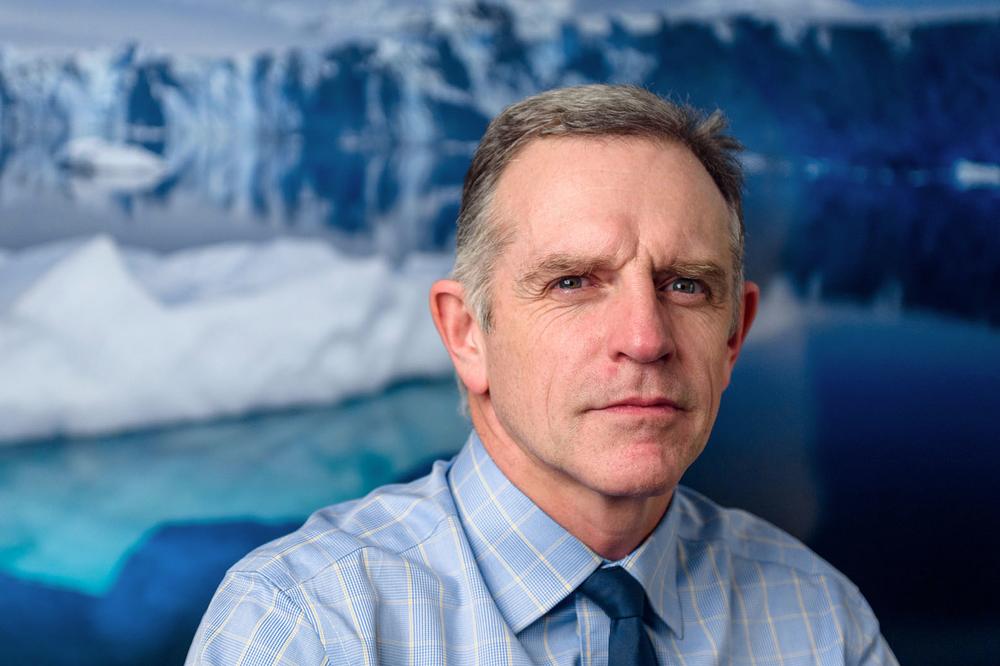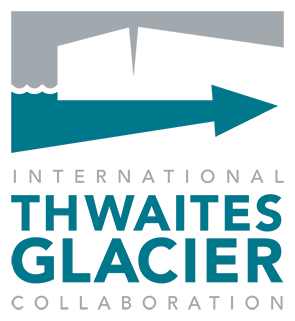
It is with deep sorrow we report the death of Professor David Vaughan who was the UK lead on the International Thwaites Glacier Collaboration (ITGC). He was suffering from cancer and passed away peacefully at home in the UK on Thursday 9 February 2023. David retired as British Antarctic Survey (BAS) Director of Science in July 2021 and remained working as the UK lead in the Science Coordination Office (SCO) for the ITGC.
Professor David Vaughan dedicated over three decades to glaciology and polar research
During his 36-year career at British Antarctic Survey, David became recognised nationally and internationally as a leading expert on understanding the response of polar ice sheets to climate change and the implications for society. He served as coordinating lead author in two rounds of the Intergovernmental Panel on Climate Change (IPCC) assessment reports and was responsible for identifying the policy-relevant issues and negotiating the acceptance of key findings by high-level policymakers.
Director of BAS Professor Dame Jane Francis says:
"David was a brilliant scientist, glaciologist and dear friend to many. He was diagnosed with cancer in 2020 after returning from a field season at Thwaites Glacier, a project that he led with amazing energy and passion. Our thoughts are with his wife Jacqui and his family."
Dr Ted Scambos, the US-lead for the ITGC, had worked with David for many years on research and in the field. He says:
"David was a leader in every sense of the word, both with scientific insights that advanced his field, and as a champion of collaborative studies that brought the community together. He thought big, aimed high, and achieved much; and became one of the best-regarded polar scientists in the world today. He was also approachable and as such mentored many young scientists throughout his career."
Dr Robert Larter, a marine geophysicist at BAS, took over David’s role in the SCO and leading the UK’s efforts on ITGC. He says:
"I am saddened to hear David Vaughan died last week after battling illness with characteristic positivity and pragmatism. I had known David for 35 years since first joining BAS, working in science teams he led for 10 of them. He was an excellent scientist and science communicator, and also an inspirational science leader. I also want to acknowledge David’s vision and key role in establishing the ITGC, which I feel privileged to be involved in.”
Professor David G Vaughan OBE obituary
Glaciologist, former Director of Science at British Antarctic Survey and coordinating lead author for IPCC
Professor David Vaughan, who has died aged 60 from stomach cancer, was a world-leading expert on how polar ice sheets are responding to climate change. Former Director of Science at British Antarctic Survey (BAS), David was the UK lead for the International Thwaites Glacier Programme and served as co-ordinating lead author in two rounds of the Intergovernmental Panel on Climate Change (IPCC) assessment reports.
During his 36 years at BAS, David’s science and leadership advanced our knowledge of the impact of climate change on polar ice sheets, his 15 years of service to the IPCC helped ensure that science was available to policy makers worldwide, and his enthusiasm for science communication enabled the wider public to understand why the polar regions are crucial for planet Earth.
Early in his career at BAS, an interest and talent in drawing maps made David his group’s expert in analysing satellite imagery. This ensured the group was able to identify profound changes in the ice on the Antarctic Peninsula. In 1989, using a series of Landsat images, they showed that the Wordie Ice Shelf had halved in area in little over a decade.
The Wordie’s retreat was, their paper in Nature concluded, a rapid and dramatic response to recent climate warming recorded along the Antarctic Peninsula. It was the first major climate impact reported in continental Antarctica and one of the first examples of a large-scale physical system impacted by contemporary climate change.
In 1995, far more dramatic changes took place on the Antarctic Peninsula. David was in Cambridge when two ice shelves on the Peninsula’s northern tip collapsed in a matter of weeks. He asked a planned flight from the UK's Rothera station in Antarctica to the Argentine station Marambio to take aerial photographs of the Larsen Ice Shelf, images that showed behaviour never previously recorded. A 1600-km2 section of the 200m-thick Larsen A had shattered like a car windscreen, its remains – an armada of icebergs as big as football pitches – drifting out to sea.
For the group, the changes provided certainty that these ice shelf changes were due to regional climate change. The pattern of retreating ice shelves fitted their theory that there was a ‘climatic limit-of-viability’ for ice shelves which had been driven south as climate warmed on the Antarctic Peninsula. Once again, the findings were reported in Nature and provided a graphic illustration of climate change in action.
Despite the dramatic changes on the Antarctic Peninsula, they were limited in importance – a symptom of climate change, rather than something that would have wide impact. By the end of the 1990s, David saw an opportunity to refresh glacier dynamics research at BAS by looking over the ridge towards the Amundsen Sea and the West Antarctic Ice Sheet (WAIS).
Setting his sights on Pine Island Glacier (PIG) – remote from Rothera Research Station, heavily crevassed and beset by notoriously poor weather – his first foray to PIG came in 2004 with US colleagues. In following seasons several small parties led by BAS glaciologist Andy Smith undertook radar and seismic surveys there but struggled with challenging conditions.
Convinced that delivering data depended on scaling up operations, David and Andy lobbied to bring in tractor trains – a first for BAS – and a team of nine scientists joined the iSTAR traverse in late 2013. A second successful traverse followed in 2015/16, laying the foundations for the International Thwaites Glacier Collaboration – one of the the largest field programmes ever undertaken in Antarctica – which will help glaciologists understand and predict the future of this epic glacier to global sea-level rise.






